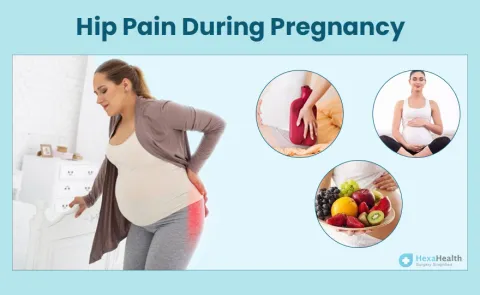Hemoglobin in Pregnancy: Normal Range, How to Increase

Quick Summary
- Haemoglobin is a protein in red blood cells that carries oxygen from the lungs to the rest of the body.
- Low haemoglobin levels in pregnancy can lead to a number of complications, including anemia, premature birth, and low birth weight.
- There are a number of things that pregnant women can do to maintain healthy haemoglobin levels, including eating a healthy diet, getting enough iron, and staying hydrated.
Table of Contents
- What is Haemoglobin?
- Haemoglobin Levels in Pregnancy
- Abnormal Haemoglobin Levels in Pregnancy
- Impact of Abnormal Haemoglobin Levels on Mother and Child
- Maintainance of Abnormal Haemoglobin Levels in Pregnancy
- Treatment for Abnormal Haemoglobin Levels in Pregnancy
- When to Consult a Doctor?
- Takeaway
- Frequently Asked Questions
- References
Maintaining good health during pregnancy is essential for the well-being of both the mother and the developing baby. One crucial aspect of prenatal care is monitoring the mother's haemoglobin levels in pregnancy.
In this article, we will explore the importance of monitoring haemoglobin in pregnancy and the potential risks associated with abnormal levels. We will also discuss ways to maintain healthy haemoglobin levels during pregnancy.
What is Haemoglobin?
Haemoglobin (Hb) is an essential protein found in red blood cells (RBCs) that carries oxygen from the lungs to the rest of the body. It is a vital component of the circulatory system and plays a critical role in maintaining overall health.
During pregnancy, haemoglobin is especially important, as the mother's body must supply oxygen to the developing baby as well as to her own organs and tissues. The increased demand for oxygen during pregnancy means that the body needs to produce more haemoglobin to meet these needs.
Without iron and vitamins, a mother's body cannot produce sufficient haemoglobin. Thus, levels of haemoglobin in pregnancy decrease due to a lack of iron and other micronutrients. In addition, excess haemoglobin is harmful too.
An association is established between high haemoglobin, haematocrit levels and pregnancy complications.
High haemoglobin levels can lead to medical complications like pre-eclampsia, preterm delivery, low birth weight, intrauterine growth restriction, and intrauterine death. Let us see what is the haemoglobin level in pregnancy.

Haemoglobin Levels in Pregnancy
Haemoglobin levels can vary during pregnancy due to changes in the body's blood volume and the increased demand for oxygen. Generally, the normal range for haemoglobin in non-pregnant women is between 12 to 16 g/dL.
However, during pregnancy, haemoglobin levels may drop slightly due to the expansion of blood volume in the body. The World Health Organization (WHO) considers haemoglobin levels of 11 g/dL or lower to be indicative of anaemia in pregnancy.
Haemoglobin levels are typically checked during routine prenatal care visits. If levels are found to be low, additional testing may be necessary to determine the cause and severity of the anaemia.
Common causes of low haemoglobin levels during pregnancy include iron deficiency, folic acid deficiency, and vitamin B12 deficiency.
Abnormal Haemoglobin Levels in Pregnancy
Abnormal haemoglobin levels during pregnancy can have significant implications for both the mother and the developing baby. The Hb levels during pregnancy can vary as below.
Low Haemoglobin Levels
Anaemia is a common blood disorder caused due to low haemoglobin levels that occurs when the body doesn't have sufficient red blood cells or haemoglobin to carry oxygen to the body's tissues.
Several causes contribute to low haemoglobin in pregnancy. Given are the most common causes of low haemoglobin in pregnancy:
- Lack of Iron: The volume of blood increases significantly during pregnancy. To produce more red blood cells, more iron and vitamins are required. A lack of iron can lead to low haemoglobin in pregnancy.
- Insufficient iron stores: The baby uses the mother’s red blood cells for growth and development during pregnancy, especially in the last three months. Thus, due to insufficient iron stores, haemoglobin level during pregnancy drop.
- Lack of Vitamin B12: Your body requires vitamin B12 to produce haemoglobin and red blood cells. Vegan women are more prone to vitamin B12 deficiency than other women. A lack of vitamin B12 can lead to a dip in haemoglobin in pregnancy.
- Lack of Folate: Folic acid, often known as folate, helps cell growth when combined with iron. Iron deficiency may result from a lack of folate during pregnancy. This is another factor for low Hb levels during pregnancy.
High Haemoglobin Levels
High levels of haemoglobin during pregnancy may indicate a condition called polycythemia, which occurs when there is an excessive number of red blood cells in the body. This condition can lead to complications such as an increased risk of blood clots and problems with blood flow to the placenta.
High haemoglobin levels during pregnancy can be caused by a variety of factors, including:
- Dehydration: If a woman is dehydrated, her blood may become thicker, which can increase haemoglobin levels. It is essential for pregnant women to drink enough water and fluids to prevent dehydration.
- Smoking: Smoking can increase haemoglobin levels and also reduces the amount of oxygen available to the body. Pregnant women should avoid smoking to prevent potential complications for themselves and their developing baby.
- Pre-existing medical conditions: Women with pre-existing medical conditions, such as lung disease or heart disease, may have high haemoglobin levels due to the body's response to these conditions.
- Genetic conditions: Some genetic conditions, such as polycythemia vera, can cause high haemoglobin levels. Women with a family history of such conditions may need to undergo additional testing during pregnancy.
- Living at high altitudes: Living at high altitudes can cause the body to produce more red blood cells, which can increase haemoglobin levels. Pregnant women who live at high altitudes may need to be monitored more closely.
- Taking iron supplements: Iron supplements are commonly prescribed during pregnancy to prevent anaemia. However, if taken in excessive amounts, they can lead to high haemoglobin levels.
Impact of Abnormal Haemoglobin Levels on Mother and Child
Abnormal haemoglobin levels can significantly impact both the mother and child during pregnancy. Haemoglobin is essential for delivering oxygen to the body's tissues, and low or high levels can lead to complications during pregnancy and childbirth.
- Impact on Mother of Increased Haemoglobin Level During Pregnancy
High haemoglobin levels should be taken seriously as they indicate an underlying disorder. Addressing a high haemoglobin count is necessary even if you don't have an underlying illness.
Abnormally high haemoglobin levels can cause problems like blood clots. Here are some complications of high Hb level during pregnancy:- Decreased uteroplacental blood flow
- Placental infarction
- Late abortion (a condition where the baby fails to thrive during labour)
- Impact on Baby of Increased Haemoglobin Level During Pregnancy
- Intrauterine growth restriction
- Intrauterine death
- Impact on Mother of Decreased Haemoglobin Levels in Pregnancy
Iron deficiency anaemia has a negative impact on both the mother's and baby's health during pregnancy. It can cause complications during labour and impact newborns' health.- Breathing difficulty
- Fainting
- Exhaustion
- Palpitations
- Sleep issues due to low haemoglobin
- Risk of premature delivery
- Preterm labour
- Impact on Baby of Decreased Haemoglobin Levels in Pregnancy
Here are some effects of low haemoglobin on the baby:- Affects the baby's growth, particularly in the first trimester.
- Baby born anaemic
- Developmental disorders in the child.
- Low birth weight.
- Increased risk of morbidity and infant death.
- Intrauterine growth restriction
Maintainance of Abnormal Haemoglobin Levels in Pregnancy
Maintaining haemoglobin levels is essential for maintaining good health and well-being. There are various strategies that individuals can use to prevent or reduce their risk of developing the underlying condition.
Preventing abnormal haemoglobin levels during pregnancy involves maintaining a healthy lifestyle, including:
- Eating a balanced diet that includes foods high in iron, folate, and vitamin B12. Good dietary sources of iron include red meat, poultry, fish, beans, and leafy green vegetables.
- Taking iron supplements as recommended by your healthcare provider. Iron supplements are often prescribed during pregnancy to prevent iron-deficiency anaemia.
- Getting regular prenatal care and attending all scheduled appointments with your healthcare provider.
- Avoiding alcohol and smoking during pregnancy, as these can interfere with the body's ability to produce haemoglobin.
- Staying physically active, as exercise can help improve blood flow and promote healthy red blood cell production.
Treatment for Abnormal Haemoglobin Levels in Pregnancy
Treatment for abnormal haemoglobin levels during pregnancy depends on the underlying cause and severity of the condition. In some cases, lifestyle changes may be sufficient to improve haemoglobin levels, while in others, medical interventions may be necessary.
- Iron supplements: If the haemoglobin levels are low, iron supplements may be prescribed by the doctor. Iron is essential for the production of haemoglobin, and taking supplements can help improve haemoglobin levels.
- Folic acid supplements: Folic acid supplements may be recommended to help improve the body's ability to produce new red blood cells.
- Blood transfusion: In severe cases of anaemia, blood transfusion may be necessary to increase the number of red blood cells in the body.
- Medications: Certain medications, such as erythropoietin, may be prescribed to help stimulate the production of red blood cells.
When to Consult a Doctor?
A Haemoglobin check is done routinely throughout pregnancy. However, if you experience low haemoglobin symptoms like headache, dizziness, increased heart rate, pale skin or symptoms of high fatigue, increased sweating, easy bleeding, joint swelling, or sudden weight loss, call your healthcare provider.
Here are some points on when to consult a doctor in case of haemoglobin levels in pregnancy:
- Routine prenatal care: Pregnant women should receive regular prenatal care and routine blood tests to monitor haemoglobin levels throughout pregnancy.
- Symptoms of anaemia: If a pregnant woman experiences fatigue, weakness, dizziness, or shortness of breath, she should consult her doctor, as these may be signs of low haemoglobin levels.
- Previous history of anaemia: Women with a history of anaemia or those with low haemoglobin levels in an earlier pregnancy should discuss their concerns with their doctor.
- Abnormal blood test results: A doctor should be consulted to determine the cause and appropriate treatment if a routine blood test shows low haemoglobin levels.
- Dietary concerns: If a pregnant woman is not eating a well-balanced diet or has special dietary needs, she should consult her doctor to ensure she gets the appropriate nutrients to maintain healthy haemoglobin levels.
- Underlying medical conditions: Pregnant women with underlying medical conditions that can cause low haemoglobin levels, such as sickle cell disease or thalassemia, should consult their doctor for appropriate management.
Takeaway
Pregnancy is the most memorable and emotional phase in every woman's life which also comes with several changes in the body to support the growing baby. Changes in haemoglobin are one of the significant shifts that occur. It is crucial to maintain normal levels of Hb in pregnancy, as high or low haemoglobin levels in pregnancy can impact the health of both the mother and the baby. It is essential to diagnose the deficiency or the excess in time and treat it accordingly.
Now that you know how essential it is to maintain normal Hb levels during pregnancy, do you still have some queries about changes during pregnancy haemoglobin level? For more answers, contact a personal care assistant at HexaHealth. We are happy to guide you and resolve all your queries. You can come to our website to know more about HexaHealth and our pregnancy-related services such as Caesarean section, episiotomy, and others.
Suggested Reads
To read more on pregnancy and its care, visit the following links:
Frequently Asked Questions
How much are the normal haemoglobin levels in pregnancy?
Are lower levels haemoglobin in pregnancy common?
Yes, low haemoglobin in pregnancy is common due to changes in blood volume. Up to 52% of pregnant women in developing nations don't have enough iron during pregnancy, a common cause of iron deficiency anaemia. However, severe anaemia is rare.
However, mild or severe anaemia must be treated to protect your and your baby's health.
Why is Hb in pregnancy a cause of concern?
Low haemoglobin in pregnancy can affect the baby's growth and jeopardise the mother's health during and after labour. If you have anaemia during pregnancy, your baby could be born too early or preterm (when the delivery happens before 37 full weeks of pregnancy).
Exhaustion might also delay your ability to recover from childbirth. Iron deficiency anaemia during pregnancy is associated with low birth weight and postpartum depression.
Other issues associated with severe or untreated iron deficiency anaemia during pregnancy include placental abruption, stillbirth, and developmental delays in the baby.
What are the acceptable haemoglobin level during pregnancy?
What are the causes of low Hb level during pregnancy?
Given are common causes of low haemoglobin during pregnancy:
- The blood volume rises during pregnancy, causing anaemia.
- Low haemoglobin during pregnancy might occur due to an iron deficiency.
- A decline in haemoglobin levels during pregnancy can result from inadequate iron stores.
- Your body needs vitamin B12 to make red blood cells and haemoglobin. In pregnancy, low levels of vitamin B12 can cause haemoglobin levels to drop.
- When coupled with iron, the B vitamin folic acid, or folate, promotes cell growth. Lack of folate during pregnancy may cause iron insufficiency and low haemoglobin levels.
What happens if, during pregnancy, haemoglobin levels are higher than the normal range?
High haemoglobin level during pregnancy can cause:
- Reduced blood flow through the uterus and placenta
- Placental clot
- Intrauterine growth retardation
- Intrauterine death
- Late abortion
Why does haemoglobin increase in pregnancy?
During pregnancy, the hormones produced by the placenta and baby contribute to the increase in maternal total blood volume. In addition, placental oestrogen secretion raises renal sodium reabsorption and water retention, increasing plasma volume.
As a result, as the pregnancy progresses, red cell mass increases by 25%, and plasma volume increases by 40%, enhancing uterine placental blood flow through a decrease in blood haematocrit and thickness. This is the primary cause of elevated haemoglobin and haematocrit levels.
What are symptoms of high haemoglobin levels in pregnancy?
The symptoms of a high Hb level during pregnancy are the same as that of high Hb in general. High levels of haemoglobin can have the following symptoms.
- Easy bleeding
- Increased sweating
- Easy fatigue
- Swelling in joints
- Headaches
- Yellow discolouration of skin and eyes
- Sudden and unexplained weight reduction
How will I know if my Hb level during pregnancy is lesser than the normal range?
If you have low Hb levels during pregnancy, you will experience some of the following symptoms.
- Easy fatigue
- Breathlessness
- Sensitivity to cold
- Weakness
- Dizziness
- Increased heart rate
- Restlessness in limbs
- Dry and pale skin
- Headache
How much are normal haemoglobin levels in third trimester of pregnancy?
Does Hb increase in third trimester?
Is 9.2 haemoglobin level in pregnancy normal?
How to increase my haemoglobin level in pregnancy?
Today on the internet, most pregnant women search for how to increase my haemoglobin level in pregnancy? Eating a nutritious diet throughout pregnancy can help you increase your haemoglobin and manage iron deficiency anaemia.
Fish, poultry, and lean red meat are a few food sources of iron. You can also manage iron deficiency by eating dried beans and peas, dark green leafy vegetables, whole grains, and iron-fortified cereals.
What level of haemoglobin is dangerously high?
Dangerously high level of haemoglobin varies according to your age and gender.
- Higher than 16.5 g/dL in an adult man
- Higher than 16 g/dL in an adult woman
- Higher than 16.6 g/dL in a child
- Higher than 18 g/dL in an infant
Can high haemoglobin cause miscarriage?
According to a study from 2021, high haemoglobin levels in the first trimester of pregnancy can be just as risky for miscarriage as iron deficiency anaemia. Even more frequently than anaemia during the first trimester of pregnancy could be high haemoglobin levels.
According to a study which examined the impact of high haemoglobin concentration, women with preconception haemoglobin levels of 150 g/L had a higher risk of miscarriage. The study revealed that anaemia and high haemoglobin concentrations in early pregnancy are connected with an increased chance of suffering a miscarriage. The range of maternal haemoglobin levels between 110 and 140 g/L may serve as a potential endpoint for reducing miscarriage risk.
How much haemoglobin is required for normal delivery?
What should I do if my haemoglobin is high?
What foods reduce haemoglobin?
Here are some foods that can reduce iron absorption and thereby reduce haemoglobin levels in your body.
- Lectins in whole grains, legumes (beans, peanuts, and soybeans), and other plant foods can prevent the body from absorbing iron.
- Whole grains, seeds, legumes, and some nuts contain phytates (phytic acid), which can reduce iron absorption.
- Tea, coffee, and legume tannins can reduce the absorption of iron.
Which fruits increase blood during pregnancy?
Several foods that contain vitamin C increase iron absorption and, thereby, haemoglobin formation during pregnancy. These include
- Tomatoes
- Apricots (dried)
- Raspberries
- Strawberries
Is pomegranate good during pregnancy?
According to a 2012 study, a polyphenol abundant in pomegranate juice, punicalagin, diminishes spontaneous and induced cell death in human placental cells (trophoblasts and villous explants). This polyphenol also reduces oxidative stress.
Thus, adding pomegranate juice to the diet of pregnant women may reduce the oxidative stress and stimulus-induced cell death of placental trophoblasts, as well as the likelihood of placental malfunction.
What fruit is not good for pregnancy?
Here are two fruits that are recommended to be avoided during pregnancy.
- Papaya: According to a 2002 study done on rats, crude papaya-induced spasms of the uterine muscles are similar to that produced by the hormones oxytocin and prostaglandin. This means that papaya induces uterine spasms that may cause abortion.
Thus, it's best to avoid eating papaya during pregnancy. - Pineapple: According to some studies, A. comosus fruit (ripe or unripe) has an abortifacient effect. While unripe fruit juice is used for abortion in Bangladesh, ripe fruit has been used orally as a traditional medicine to induce abortion in Kerala, India.
The outcomes of a 2016 experiment on rats indicated that 5HT or 5HT-like compounds might be involved in the uterotonic activity of pineapple extract.
What doctor treats high haemoglobin?
Haematologists specialise in detecting, managing, and treating blood, bone marrow, and lymphatic disorders.
You should see a haematologist if your primary healthcare provider wants a blood expert to analyse the findings of your blood test. It's important to remember that preliminary blood test results don't necessarily indicate a dangerous condition.
How can I treat haemoglobin levels in pregnancy at home?
Want to know how to increase my haemoglobin level in pregnancy? Here are some ways to treat haemoglobin levels at home.
- Focus on consuming a healthy balanced diet that can suffice your iron needs.
- Add iron-rich food such as red meat, beef, lamb, pork, and pulses. Fresh green leafy vegetables like cabbage, spinach, watercress, and parsley, spring onions; seeds, dried prunes, almonds, brazil nuts, hazelnuts, raisins, figs, and apricots; fish like tuna.
- Add food rich in vitamin C, such as oranges, strawberries, and tomatoes, that enhance iron absorption in your body.
- Avoid certain food substances such as Lectins, phytates (phytic acid) and tannins that hinder iron absorption.
What is more common: Lower or Higher haemoglobin levels in pregnancy?
What is considered severe anaemia during pregnancy?
WHO classifies the severity of anaemia into three grades.
- Mild anaemia with haemoglobin 9 to 10.9g/dL
- Moderate anaemia with haemoglobin 7 to 8.9g/dL
- Severe anaemia with haemoglobin less than 7g/dL
How does anaemia affect the baby during pregnancy?
Anaemia increases the risk of preterm delivery. In addition, anaemia can cause
- Low birth weight
- Stillbirth
- Early placental separation
- Baby born with iron deficiency
- Delayed mental and intellectual development
What are the risks to the mother if haemoglobin levels in pregnancy are higher than the normal?
Are there any risks to the baby if haemoglobin levels in pregnancy are higher than the normal range?
Here are some risks of high haemoglobin level during pregnancy:
- Decreased uteroplacental blood flow
- Placental infarction
- Late abortion
- Intrauterine growth retardation
- Intrauterine death
- Preterm birth
- Small for gestational age
- Low birth weight
What does untreated anaemia do to the body?
Anaemia, or low haemoglobin in pregnancy, if left untreated, can result in significant health risks like fatigue, headaches, restless legs syndrome, heart problems, issues during pregnancy, and delays in a child's development.
Moreover, iron deficiency anaemia, may worsen other diseases or lessen the efficacy of their treatments.
How do I take care of myself when I have anaemia during pregnancy?
The best thing you can do to treat your anaemia is to try to eat a balanced, iron-rich diet. Get plenty of rest and hydrate yourself. Increase your iron-rich food intake and include spinach, lean meat.
Citrus and other foods high in vitamin C, which aid iron absorption, should also be included. Dietary supplements might also be helpful. The ideal supplement for you should be discussed with your healthcare provider. Ensuring adequate iron, B12, and folic acid is the best strategy to treat haemoglobin levels in pregnancy.
References
All the articles on HexaHealth are supported by verified medically-recognized sources such as; peer-reviewed academic research papers, research institutions, and medical journals. Our medical reviewers also check references of the articles to prioritize accuracy and relevance. Refer to our detailed editorial policy for more information.
- The relationship of hemoglobin and hematocrit in the first and second half of pregnancy with pregnancy outcome

- Maternal blood volume and cardiac output during pregnancy: a hypothesis of endocrinologic control

- High hemoglobin levels during pregnancy and fetal risk

- Maternal Hemoglobin Levels during Pregnancy and their Association with Birth Weight of Neonates

- Anemia During Pregnancy

- High Hemoglobin Count

- High red blood cell count

Last Updated on: 5 April 2023
Reviewer

A specialist in Obstetrics and Gynaecology with a rich experience of over 21 years is currently working in HealthFort Clinic. She has expertise in Hymenoplasty, Vaginoplasty, Vaginal Tightening, Labiaplasty, MTP (Medical Termination...View More
Author

She is an accomplished new-age professional who has interviewed prominent personalities such as Bhaichung Bhutia, G. Sathiyan, Shashi Tharoor, etc. A content writer interested in health communication, graphic desi...View More
Expert Doctors (10)
NABH Accredited Hospitals (5)
Latest Health Articles


























 Open In App
Open In App